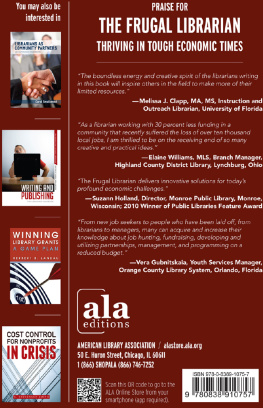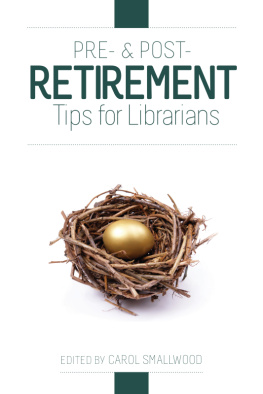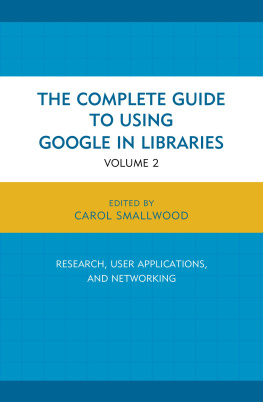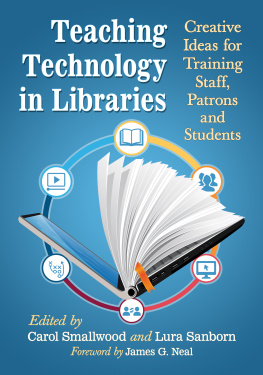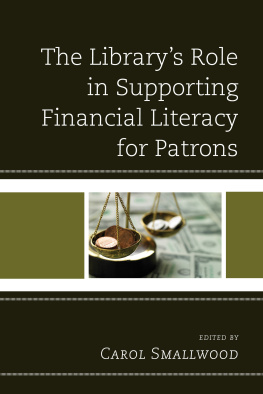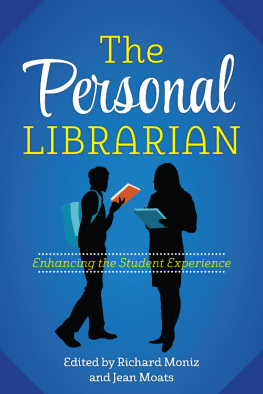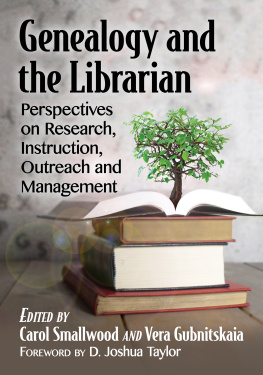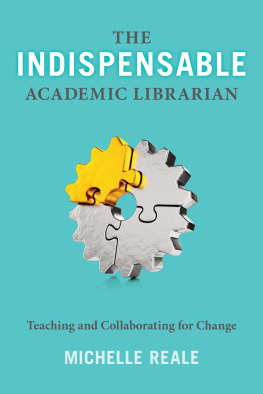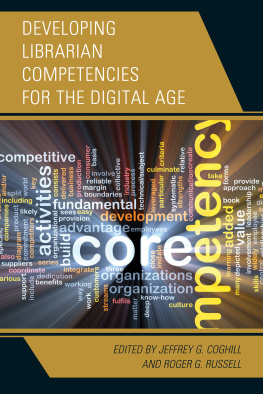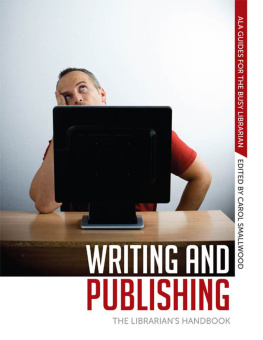Carol Smallwood - The Frugal Librarian: Thriving in Tough Economic Times
Here you can read online Carol Smallwood - The Frugal Librarian: Thriving in Tough Economic Times full text of the book (entire story) in english for free. Download pdf and epub, get meaning, cover and reviews about this ebook. year: 2011, publisher: American Library Association, genre: Home and family. Description of the work, (preface) as well as reviews are available. Best literature library LitArk.com created for fans of good reading and offers a wide selection of genres:
Romance novel
Science fiction
Adventure
Detective
Science
History
Home and family
Prose
Art
Politics
Computer
Non-fiction
Religion
Business
Children
Humor
Choose a favorite category and find really read worthwhile books. Enjoy immersion in the world of imagination, feel the emotions of the characters or learn something new for yourself, make an fascinating discovery.
- Book:The Frugal Librarian: Thriving in Tough Economic Times
- Author:
- Publisher:American Library Association
- Genre:
- Year:2011
- Rating:5 / 5
- Favourites:Add to favourites
- Your mark:
- 100
- 1
- 2
- 3
- 4
- 5
The Frugal Librarian: Thriving in Tough Economic Times: summary, description and annotation
We offer to read an annotation, description, summary or preface (depends on what the author of the book "The Frugal Librarian: Thriving in Tough Economic Times" wrote himself). If you haven't found the necessary information about the book — write in the comments, we will try to find it.
The Frugal Librarian: Thriving in Tough Economic Times — read online for free the complete book (whole text) full work
Below is the text of the book, divided by pages. System saving the place of the last page read, allows you to conveniently read the book "The Frugal Librarian: Thriving in Tough Economic Times" online for free, without having to search again every time where you left off. Put a bookmark, and you can go to the page where you finished reading at any time.
Font size:
Interval:
Bookmark:


2011 by the American Library Association. Any claim of copyright is subject to applicable limitations and exceptions, such as rights of fair use and library copying pursuant to Sections 107 and 108 of the U.S. Copyright Act. No copyright is claimed in content that is in the public domain, such as works of the U.S. government.
Printed in the United States of America
15 14 13 12 11 5 4 3 2 1
While extensive effort has gone into ensuring the reliability of the information in this book, the publisher makes no warranty, express or implied, with respect to the material contained herein.
ISBN: 978-0-8389-9187-9
Library of Congress Cataloging-in-Publication Data
The frugal librarian : thriving in tough economic times / edited by Carol Smallwood.
p. cm.
Includes bibliographical references and index.
ISBN 978-0-8389-1075-7 (alk. paper)
1. Library finance--United States. 2. Libraries--United States--Cost control.
3. Libraries--Economic aspects--United States. 4. Library science--Economic aspects--United States. 5. Libraries and community--United States. 6. Libraries--United States--Case studies. I. Smallwood, Carol, 1939
Z683.2.U6F73 2011
025.110973--dc22
2010034317
Book design in Charis SIL and Avenir by Casey Bayer.
 This paper meets the requirements of ANSI/NISO Z39.48-1992 (Permanence of Paper).
This paper meets the requirements of ANSI/NISO Z39.48-1992 (Permanence of Paper).
ALA Editions also publishes its books in a variety of electronic formats. For more information, visit the ALA Store at www.alastore.ala.org and select eEditions.
Michael A. Germano
Jason Kuhl
James Lund
J. James Mancuso
Colleen S. Harris
Margaret Lincoln
Lois Stickell and Lisa Nickel
Victoria Lynn Packard
Vandella Brown
Wayne Finley and Joanna Kluever
Lisa A. Forrest
George Bergstrom and Mary Dugan
Emily Dill
Tom Taylor
Rebecca Tuck and Lisa Fraser
John Helling
Kacy Vega and Kim Becnel
Lisa L Crane
Leslie Farison
Sarah Passonneau
Colleen S. Harris and Mary Chimato
Ken Johnson and Sue Hisle
Tom Cooper
Emily Asch
Aline Soules and Sarah Nielsen
Edgar C. Bailey Jr.
Robert Holley
Colleen Driscoll
Marwin Britto
Gwen Evans
Mary S. Laskowski and Fang Huang Gao
Heidi Blackburn and Erin Davis
Marwin Britto
Regina Koury
T HE THIRTY-FOUR CHAPTERS of The Frugal Librarian present insightfuland often personalresponses and recommendations on how to not only survive but also thrive in tough economic times. Some chapters focus on what librarians naturally do best as they serve as the public's key trusted source for information. Thus, the first section in the book provides advice for serving patrons and their job-seeking needs. Marwin Britto describes how librarians can help faculty advance their technology skills. Many chapters provide descriptions of useful resources including social networking sites such as LinkedIn.com, business information websites, and sources of grants. Patron-centered concerns also underlie the chapters on public programming, which describe such successful events as a Rooftop Poetry Club and a Green Talk series of workshops. James Lund, Wayne Finley, and Joanna Kluever take the glass-half-full view, advocating taking advantage of the economic crisis by calling on librarians to expand their loyal patron base and create programs that are based on community needs.
Job loss is the greatest concern during economic shifts. J. James Mancuso writes more closely from the heart, as he learned to turn the box sideways, to create new part-time employment after he lost his position as a theological librarian. Margaret Lincoln took on new responsibilities in anticipation of a change in her job as a school librarian. Kacy Vega and Kim Becnel consider how to continue to add a service, in this case outreach, when staff positions are eliminated.
In the early days of the development of librarianship as a profession, the focus was on library economy. Librarians are rediscovering efficiencies in efforts to reduce costs. This volume's contributors present various approaches to better cost efficiencythrough bidding service contracts, streamlining digitization, selling gifts and weeded items, using green features, and relying more on data in making decisions.
For alternatives to face-to-face continuing education, Colleen S. Harris describes other opportunities to stretch oneself and learn, including writing for publication. For those who attend library conferences, Regina Koury shares her strategies for limiting the usual expenses. In tough times, librarians turn to making new connections and partnerships. The five chapters in part V, Sharing, cover such collaborations as joint-use facilities, the advantages of multitype regional libraries, and partnering in technical services through communal acquisitions decisions, shared catalogs, and open-source products.
Though all library staff are involved in identifying and implementing creative means to reduce expenses while continuingor even expandingservices, it is natural that staff turn to management (part VI) for vision, advice, and coordinated decision making. The chapters on staffing (part VIII) offer ideas to meet and satisfy the largest budget categorypersonnel.
When all is said and done, the contributors to this volume illustrate that libraries serve as vital and central human services centers. The library public has responded, with library borrower's cards and visits at an all-time national high. Although faced with the necessity of reducing expenses, and even reducing staff, libraries and librarians demonstrate once again their versatility and their ability to adjust to and be creative in the face of economic challenges.
Dr. Loriene Roy
Professor, School of Information
University of Texas at Austin
L IBRARIANS ACROSS THE United States are experiencing rises in prices while cutbacks shrink their resources as they struggle to keep up with information technology and patron needs. Economics, as in other professions, is affecting all types of libraries, but librarians are meeting the challenge with creativity and dedication.
To prepare this volume I sought chapters from practicing public, school, academic, and special librarians from different areas in the country to help colleagues manage their libraries. I asked contributors to share 2,1002,300 words written by one librarian or coauthored by two and to use sidebars and headings to guide the reader.
Contributors were chosen for the relevance of their topics as well as their ability to convey information clearly after being given Gustave Flaubert's advice: Whenever you can shorten a sentence, do. And one always can. The best sentence? The shortest. Their contributions have not been published elsewhere.
It was a pleasure working with these professionals willing to share their experiences with colleagues. Their innovation and dedication are evident in this timely anthology.
Carol Smallwood

Font size:
Interval:
Bookmark:
Similar books «The Frugal Librarian: Thriving in Tough Economic Times»
Look at similar books to The Frugal Librarian: Thriving in Tough Economic Times. We have selected literature similar in name and meaning in the hope of providing readers with more options to find new, interesting, not yet read works.
Discussion, reviews of the book The Frugal Librarian: Thriving in Tough Economic Times and just readers' own opinions. Leave your comments, write what you think about the work, its meaning or the main characters. Specify what exactly you liked and what you didn't like, and why you think so.

